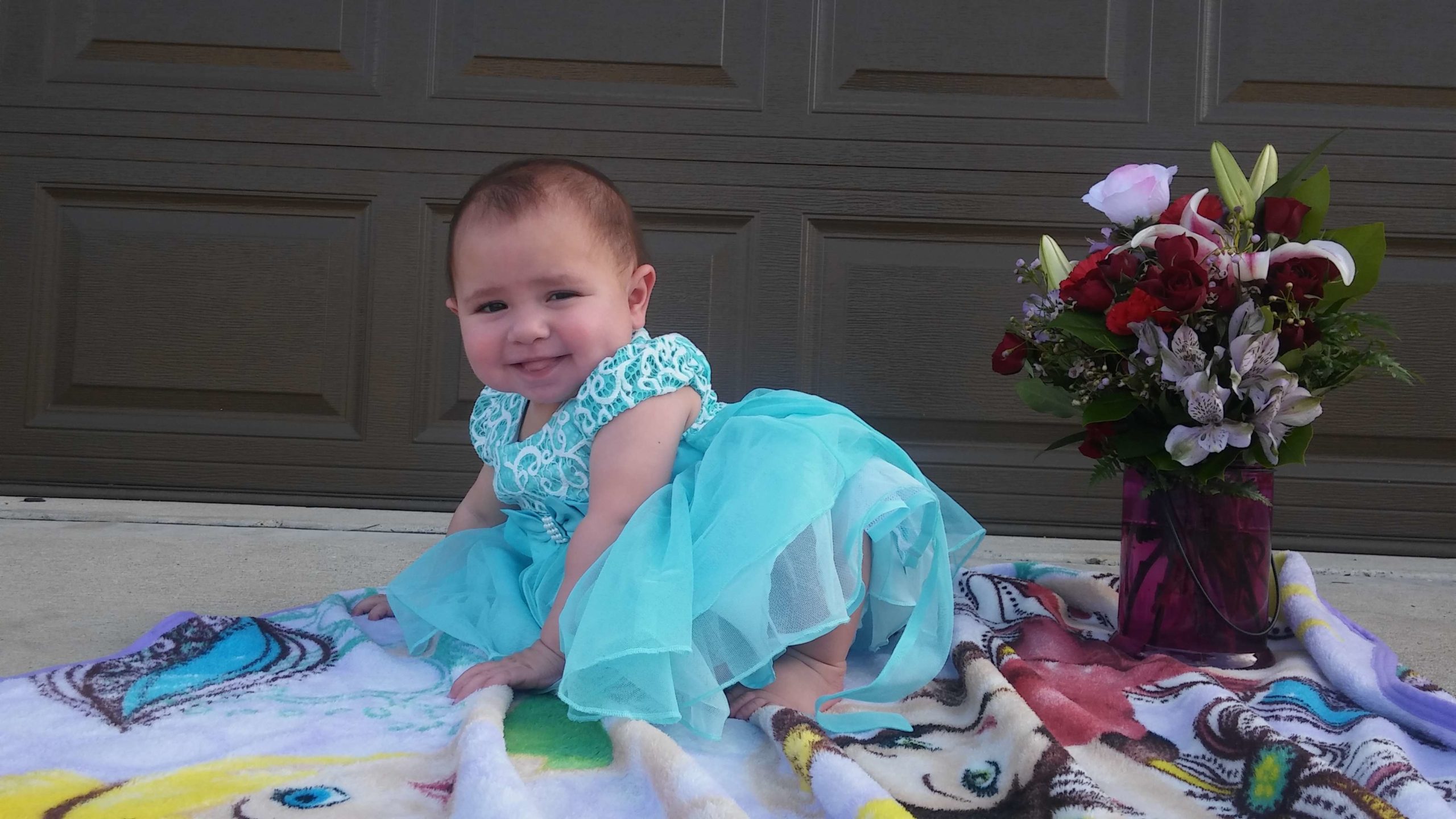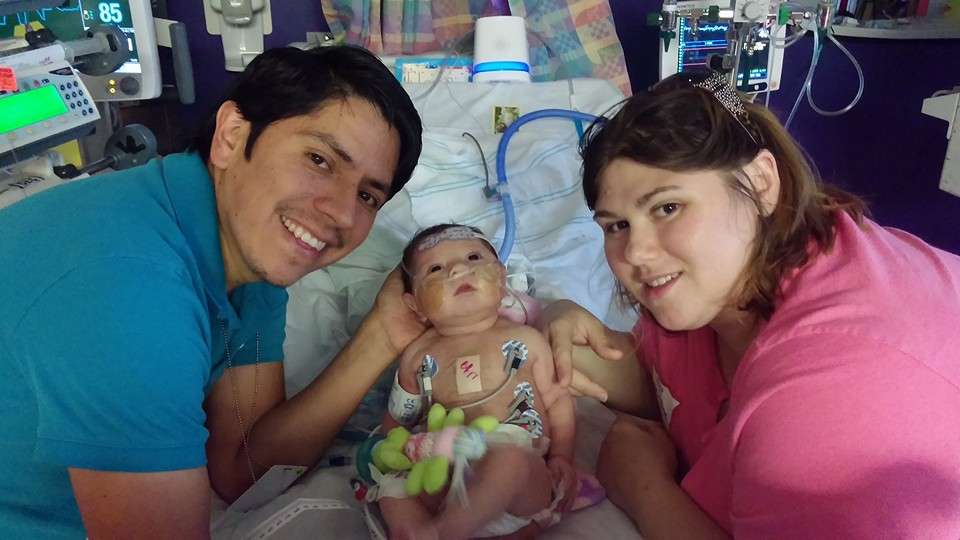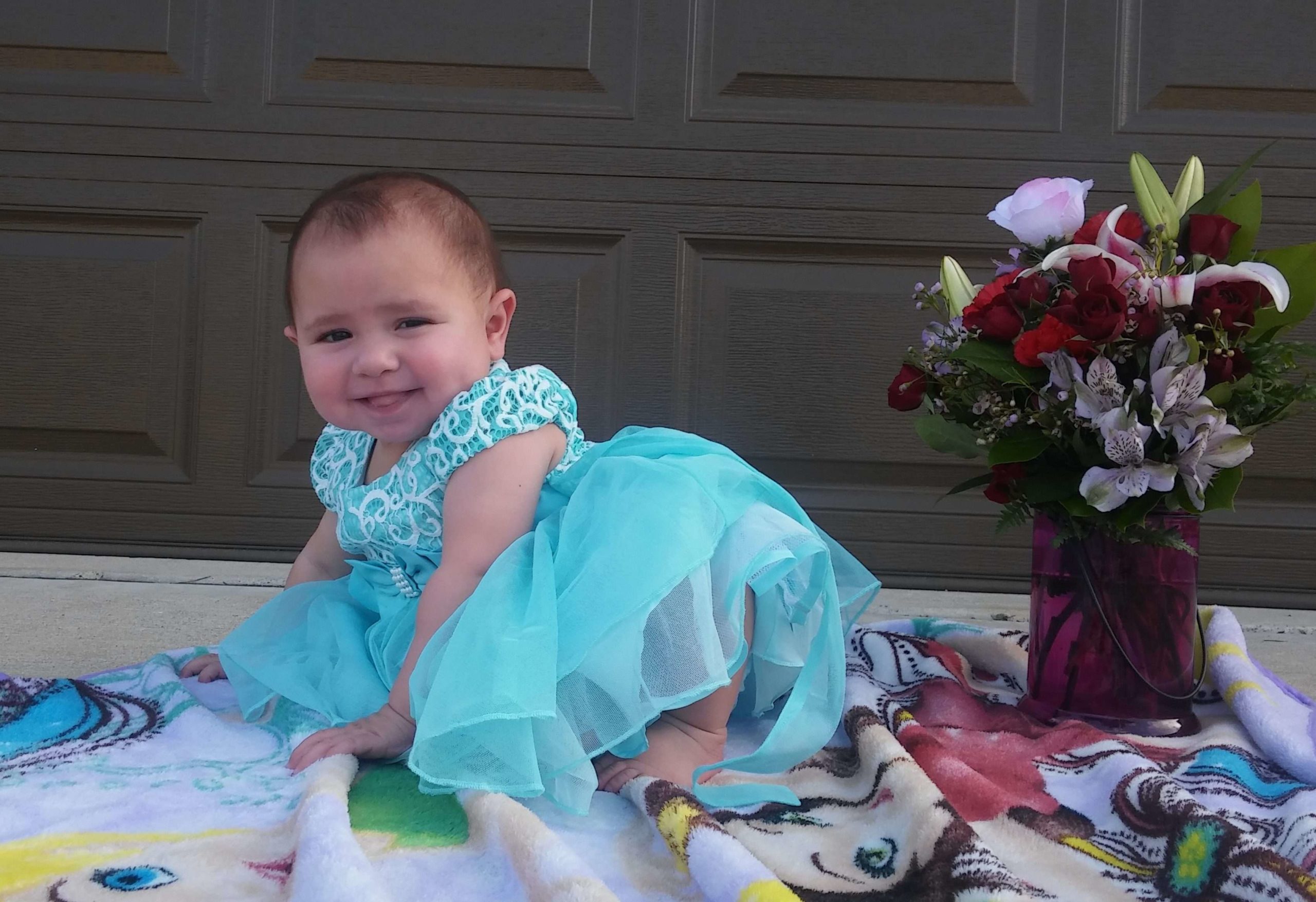 Bloomington, Indiana – August 1, 2017 – Each year, August 1st -7th is recognized as National Minority Donor Awareness Week, which is a period of time one Texas family will be celebrating with joy and gratitude. If a suitable heart donor had not become available, it is possible their third daughter, Elena Zoe, would not be alive and running around the yard with her sisters today.
Bloomington, Indiana – August 1, 2017 – Each year, August 1st -7th is recognized as National Minority Donor Awareness Week, which is a period of time one Texas family will be celebrating with joy and gratitude. If a suitable heart donor had not become available, it is possible their third daughter, Elena Zoe, would not be alive and running around the yard with her sisters today.
The Robalino family’s transplant story began several years ago with the birth of their second daughter, Katalina, who was born with a congenital heart defect (CHD). Katalina had a large hole in her heart that had to be repaired. Big sister, Anastacia, had not experienced any health challenges like this and the young family was frightened by this news and somewhat alone as they had just relocated from Connecticut to Texas. Katalina’s surgery was performed in June 2014 and her parents, Katina and Eduardo, remembered handing her over to a complete stranger who was going to perform open heart surgery on their precious little girl. At the time, it was the hardest thing they could imagine.
Little did they know something much worse was yet to come.
Katina and Eduardo made the decision to relocate their then family of four to Texas where teaching jobs were plentiful for Katina. After getting settled in a new home and a new job, they were instantly faced with daughter Katalina’s open heart surgery, but her recovery was smooth and the family continued to become more settled in their new Texas community. In August 2014 Katina and Eduardo were thrilled to find out they were pregnant, a planned pregnancy, as they were hoping for a little boy. Life had other plans; they were pregnant with their third girl. Katina took extra prenatal precautions and requested tests be done to make sure this baby was healthy and had no heart issues. All blood tests and ultrasounds came back negative and both Katina and Eduardo breathed a sigh of relief. The pregnancy was fairly easy so Katina continued working as a teacher. They were able to move into a new home that was big enough for their growing family on Christmas Eve 2014.
A special ultrasound was performed at Katina’s 34-week pregnancy check up. Always a little nervous, Katina asked the technician to look at the baby’s heart while the test was being done. She did and within two minutes excused herself and returned with a doctor. After the test was finished, the doctor asked Katina, “Does CHD run in your family?” Katina’s heart sunk. She tried not to get too excited when she calmly asked the doctor, “Oh, is there a hole in her heart like my other daughter?” The doctor grabbed Katina’s hand, looked her straight in the eyes and told her this baby’s condition was much worse. The doctor said the baby was missing half her heart and was only still alive due to the blood, oxygen and nutrition coming from Katina. Katina remembers very little after that except walking to her car and collapsing once she got in.
The next weeks of the pregnancy were filled with appointments and paperwork and medical jargon and so much confusion for both Katina and Eduardo. Another ultrasound procedure was ordered and once the nearly three-hour test was finished, a team of doctors met with the extremely anxious Robalinos. The baby’s condition was very rare and they finally had a diagnosis — tricuspid stenosis with pulmonary atresia. Half of her heart was working and two chambers were underdeveloped and would need to be fixed. That ‘fix’ would be a series of three surgeries that would begin within the first week she was born. According to Katina, “We talked with the surgeon for hours, but what I remember from the whole conversation was that our baby’s life expectancy would be about 20 to 30 years and we, her parents, would likely outlive our daughter. I cried and cried. When we left that day we were unsure whether to plan for a funeral or a birth.”
Katina and Eduardo decided in the car on the way home from that appointment the baby would be named Elena Zoe, which in Greek means life, because they were going to give her one no matter how short or long it was going to be.
At her 38th week of pregnancy, Katina underwent a cesarean section. Eduardo and the family’s priest were there. The delivery was complicated, but Elena Zoe was delivered in April 2015 and placed in the NICU. Katina had to be rushed to the ICU because she had lost 11 pints of blood during the delivery. An emergency hysterectomy had to be performed to control the bleeding and Katina’s bladder needed to be repaired too. It was two days after delivering the baby that Katina finally met her. Katina was released from the hospital and went home to recover and spend time with her other girls. Elena Zoe would be inpatient for some time due to the heart reconstruction surgeries she would require.
Elena Zoe coded during her first heart surgery when she was about a week old, and the team had to perform CPR on the tiny infant. She did recover but had to be placed on life support for 10 days. During this time, Katina had to undergo major surgery as well due to a complication from her hysterectomy. Eduardo’s reality was his wife undergoing surgery on one floor, with his baby daughter on another floor clinging to life on a respirator. Both mother and baby had lengthy recoveries but eventually Katina was allowed to go visit Elena Zoe. When she looked inside the room to see her baby for the first time on life support, Katina remembers a blood filtering machine that was as large as the room and a pale, lifeless tiny form that looked like a doll.
Katina was finally released from the hospital and by this time her mother had arrived from Connecticut to provide care for the two girls at home. Eduardo had to return to work because Katina was not getting paid and the household and medical bills were piling up at an alarming rate. While Elena Zoe seemed to be getting stronger, she remained on a respirator to keep her alive. Her surgeons told Katina and Eduardo their baby, in addition to her original diagnosis, did not have any coronary arteries and there was nothing more they could do for her. The stunned parents were told her only chance for survival was a heart transplant and the family was sent to Texas Children’s Hospital for more testing, paperwork, medical jargon, unbelievable stress … and also a glimmer of hope.
According to Katina, “We met with more surgeons, the transplant team, a transplant pharmacist and many other specialists who all had to run many tests on our baby. It was exhausting and very emotional. It was also here we met with a transplant social worker who introduced us to the Children’s Organ Transplant Association (COTA). I put the information she gave us in my bag and really did not think about it for a bit. We got the news that Elena Zoe was listed for a new heart and we were so happy and so scared at the same time. The next day I filled out the COTA application and prayed a new heart would come soon and we would figure out how to pay for everything.”
COTA uniquely understands that parents who care for a child or young adult before, during and after a life-saving transplant have enough to deal with, so COTA’s model shifts the responsibility for fundraising to a community team of trained volunteers. COTA is a 501(c)3 charity so all contributions to COTA are tax deductible to the fullest extent of the law, and these COTA funds are available for a patient’s lifetime.
Katina remembers a very welcoming telephone call with the team at COTA. “It was like talking to a trusted family member. COTA listened to my family’s story and instantly asked what our immediate needs were,” she said. Katina told the COTA team member her family was in financial trouble, specifically with their mortgage because she had been unable to work. Katina said she felt so calm after this first COTA call; she finally felt like she could exhale.
Elena Zoe received her new heart on June 19, 2015, which was just in time because the medical team had said the day before there was nothing else they could do for the tiny infant. Katina and Eduardo rushed to the hospital the minute they received the call, but their hearts went out to the mother of the child who had died. They whispered a ‘thank you’ for this selfless, anonymous act that not only saved their daughter’s life, but the lives of five other children.
“When we first saw our baby after the 12-hour transplant, it was like a scene out of a movie,” Katina said. “She was so swollen and had so many wires coming out of her. We just sat and stared at her until we were asked to leave.” Her recovery was quick and for the first time in her life, Elena Zoe’s skin turned a beautiful pink. In only a week’s time she was released from ICU to a recovery floor at Texas Children’s. While Katina and Eduardo were breathing sighs of relief about their baby’s miraculous transplant and recovery, the reality of the family’s financial crisis was becoming more than either of them knew how to handle.
Katina took extra work teaching summer school but found out she would not be paid until the end of August with a lump sum payment. Their financial stress was mounting and they both were trying to deal with the very real possibility that they would soon lose their home. While taking a break from teaching one morning, Katina’s phone rang and she did not recognize the number. She was shocked when she answered the phone.
“It was the CEO of COTA. I could not believe it. He asked me how I was doing and I told him great now that our daughter had a new heart. He was genuinely excited for our family. I could hear the excitement in his voice. He had heard bits and pieces of our story from staff members and could not believe all we had been through. He wanted to see how COTA could help. I was stunned. I literally had no words. I thanked him for what seemed to be hours and he simply told me he needed no thanks, he was just happy that COTA could help,” Katina remembers.
“I will never forget the words COTA’s CEO said to me, ‘You hang in there, OK, Katina? Just know we are here for you and we will always have your back. The worst is over; now let us help from here. Just breathe.’ I teared up and started to cry. We said goodbye, I hung up the phone and began to finally feel things were going to be OK.”
Elena Zoe was released from the hospital on August 25th. It was the first time Katina and Eduardo were able to carry her across the threshold and into their home — a home they did not lose. It was, according to Katina, the best feeling in the world. While Elena Zoe’s road to recovery has definitely had some significant bumps and hurdles, she is making progress.
“COTA continues to call every so often to check up on us and it is always so nice to see the number pop up on our caller ID,” said Katina. “Throughout this transplant journey we have learned how strong we are, but we also know because of COTA we were able to cling to hope at a time of crisis and desperation when there was very little hope to be found.”
Katina and Eduardo will be forever grateful to the donor family who made the decision to donate their beloved child’s heart while struggling through their grief. Due to the selfless gift of her new heart, Elena Zoe is a toddler who is literally unstoppable and is starting to meet her developmental benchmarks. Katina and Eduardo are also forever grateful to the Children’s Organ Transplant Association for supporting their family, for keeping their family whole and for giving them hope.
Many COTA families are waiting for the life-saving call Elena Zoe Robalino’s family received. Please go to donatelife.net and register to be an organ donor in your state. Every day 22 people die waiting for an organ transplant here in the United States. One organ donor can save eight lives.



